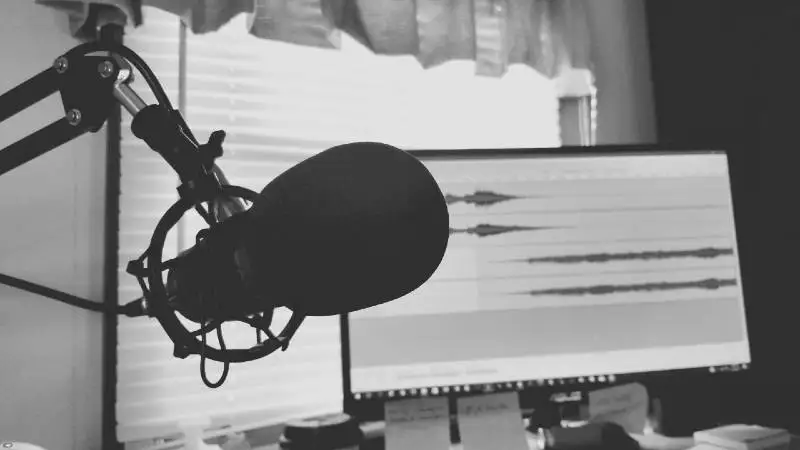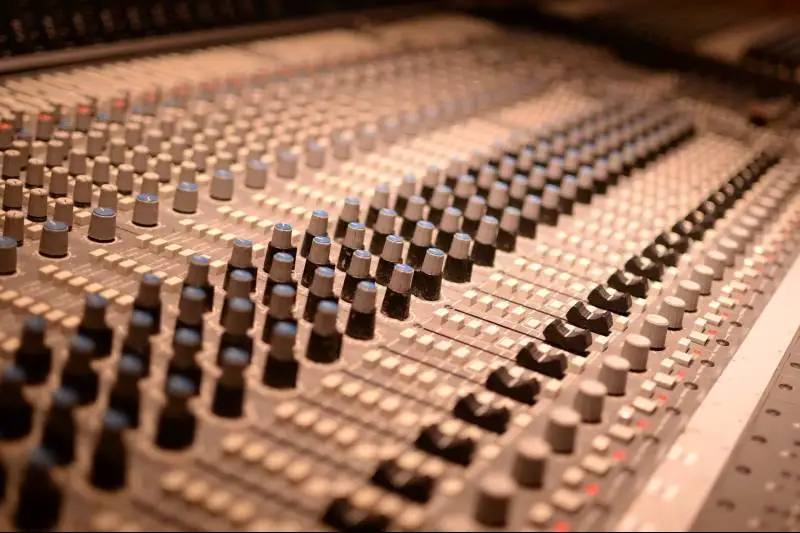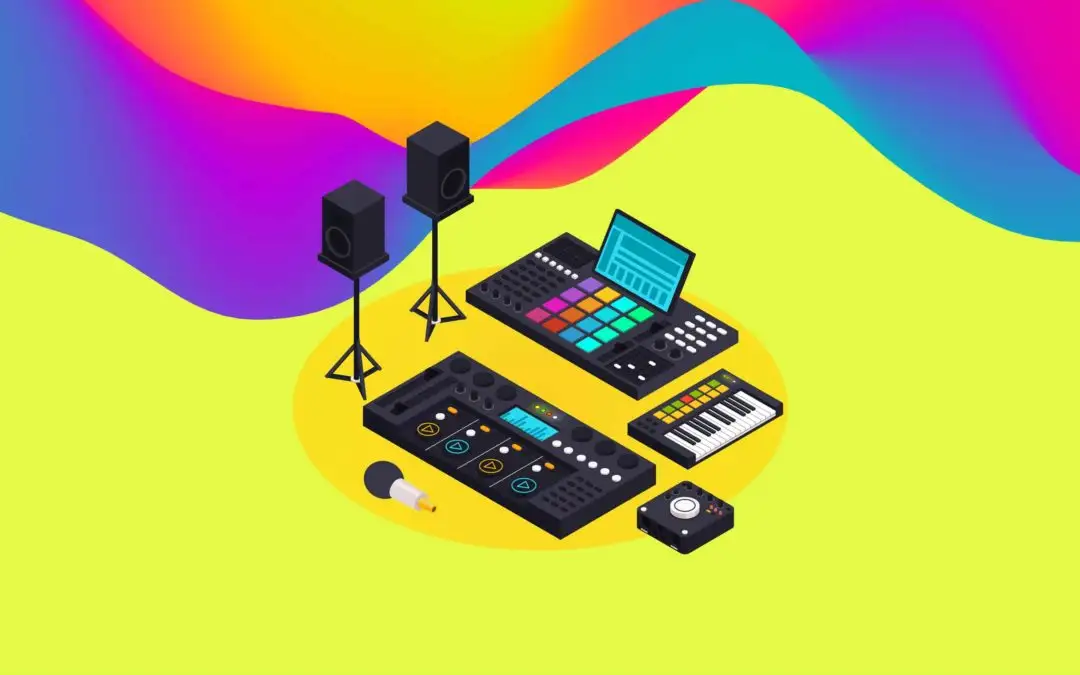Audio mastering sounds complicated. Most indie producers shudder at the thought of trying to master a track themselves.
I’d be lying if I didn’t tell you that audio mastering is complicated. But it doesn’t have to be as complicated as many make it out to be.
Just like anything else, you can learn how to master music with the right amount of dedication and information. If you have the drive and the time, you can learn the basics and seek to get better over years of practice.
To get you started on that path, I’ve put together a comprehensive guide to music mastering. Here’s what we’ll cover:
- – What Is Mastering?
- – What’s The Point Of Mastering Your Music?
- – Basic Tips For Mastering
- – A Step-By-Step Guide To Mastering
- – Audio Mastering Is A Learning Process
- – Listen To The Difference
What Is Mastering?
First, let me give you what you came here for: the definition of audio mastering.
Mastering is the final step in making a song that sounds professional. The main purpose of mastering is to balance out the different elements that make the song and ensure it sounds good, regardless of the speakers used. The process of mastering involves things like limiting, EQ, stereo improvement, and compression to provide you with that well-engineered and well-mixed song.
Furthermore, mastering also helps you with fixing those annoying sounds, such as hisses or clicks. Although mastering can help with some of the issues related to mixing, that's not its main purpose. There’s no guarantee mastering can fix mix problems. The mix should be solid first and foremost. But mastering can help if needed.
Song mastering simply refers to mastering a single audio file, while album mastering also attempts to make the entire set of tracks sound cohesive.
Most importantly, audio mastering allows your music to get to the level of those professional-sounding tracks on different streaming sites , taking not just loudness and clarity but overall quality into consideration.
“Mastering is what gives depth, punch, clarity and volume to your tracks.”
– Matt Forger, musician/producer (Michael Jackson, Quincy Jones)
Types Of Mastering: Stereo vs. Stem Mastering
When it comes to professional audio mastering, there are two types: Stereo and stem mastering. The two types more or less encompass the same process and refer to which elements are being used to create proper stereo enhancement for the final song.
What is stereo mastering?
Stereo mastering is a mastering method in which the audio process is focused around a single digital file, or the final mix of a track. Tracks mastered in this method should have stellar mixes, as it's difficult to perform audio restoration if certain errors are baked into a mix.
What is stem mastering?
Stem mastering is when the audio production process is applied to each of the individual tracks, otherwise referred to as stems . This type of mastering is more detailed and may require more collaboration with the mixing engineer to achieve a greater starting point in terms of sound quality.
Regardless of the type of mastering, a mastering engineer's job is to create a fairly consistent dynamic range, emphasize key elements through compression, and overall, make the music sound better on any and all playback systems. The end result is always more important than the methodology.
How Is Mastering Different From Mixing?
A lot of beginners get these two confused.
Even though they are similar in some ways, they are definitely not the same thing. Mixing is the process of shaping the different instruments to work together as one. Mastering is taking that “one” overall sound and polishing it up and enhancing it.
During the mixing stage, you’re setting gain levels , panning tracks , and using audio effects to make the whole song sound great. Then mastering takes that already great-sounding song and gives it a bath to clean it up further.
So where did we get mastering?
Well, it started when audio engineers had to take their recordings from tape and prepare them to be cut to vinyl. They’d create what was called a “master disc.” In this process, they had to lessen peaks in the recording - the energy from peaks could be too much for the disc cutter or they could detach the stylus from the vinyl.
That’s when they started using compressors and limiters. And that’s how we, in the digital age, ended up with the craft of audio mastering.
Now we’re going to talk more about the “how to” of mastering.

What’s The Point Of Mastering Your Music?
Why master your music? Let’s start with the basics. With proper mastering:
- Your songs should sound great on any kind of speaker, headphones, earbuds, etc.
- Your songs should be as loud as the current industry standard.
- Your songs should sound good enough to get spins on the radio or a top Spotify playlist.
- Your songs should sound much better than when they were only mixed.
Now to breakdown each of these points…
People listen to music on all sorts of devices nowadays. Earbuds, phones, car speakers, and super nice studio monitors. Mastering helps your song sound great on each of those devices. Unmastered songs sound amateurish and unpolished, which really can negatively impact how listeners feel about the tracks.
If you’re releasing an album, mastering makes sure the album is consistent across all the songs. Each track needs to be at the same loudness. They need to sound like they should actually be on the same album.
Simply put: you need to master your music if you want it to sound professional and for music listeners to receive it with open ears. Only then will it have an opportunity to do well on Spotify and other music platforms.

Basic Tips For Preparing Yourself To Learn / Practice Mastering
Before we jump into the step-by-step mastering guide, let’s cover some of the basics first. Try starting with these tips:
- Master in a room you know . Be familiar with how sound moves around your room.
- Do an A/B test between your master and your original mix to see what has been affected. This can help you spot any problems with the mix.
- Compare your mastered song to a reference track.
The more you apply mastering effects, the more it will alter the track. Too much mastering is not a good thing.
Understanding The Different Types Of Audio Post Production
The mastering stage can be broken down into three different types of processing: dynamics processing, spectral processing, and temporal processing. Keep in mind that temporal processing is oftentimes used exclusively during mixing, but we'll still cover it since some mastering engineers use it. Here is a basic breakdown of each processing type:
- Dynamics processing: Dynamic processing focuses on the loudness or amplitude of the different waveforms throughout your song. Digital masters aim to have a fairly consistent sound throughout, and achieve this through compressing the stereo file with a keen ear. A skilled engineer analyzes the dynamic range and uses tools like dynamic range compression to create a consistent listening experience across sound systems.
- Temporal processing: Temporal processing usually applies to using time-based effects like reverbs and delays . While a mastering engineer won't use these effects on an entire mix, he or she will check the stereo image to ensure that there aren't any odd playback features on a variety of speakers before finalizing a master for radio play.
- Spectral processing: This refers to the stereo enhancement of individual tracks or a full mix by looking at the full waveform of a song within a spectral analyzer or EQ. These changes are made in order to balance out the song and create a consistent sound throughout.
Can eMastered Help Me Master My Music?
Yes! E-Mastered is designed to simplify the mastering process for producers and musicians alike. Using a credible, AI-powered mastering service can help you put the final polish on your tracks without breaking the bank. Our services are designed and backed-by Grammy-winning engineers, so you can count on a solid post production process experience. As long as you deliver a finished mix, you should be able to master your music with our tools.

A Step-by-Step Guide To Mastering
Okay, now we’re going to walk you through what you need to do to get your track mastered. Just a heads-up, this gets a little complicated, but we'll try to explain things in the simplest way possible.
Signal Flow
Signal flow refers to the order in which you use different plugins. As a beginner, here’s the best signal flow to start with: Source → EQ → Compressor → Clipper → Limiter → Metering
The source is your track, the WAV file.
Equalization
The first thing we’ll do in the mastering process is Equalize (EQ) the overall mixdown to make unwanted frequencies more hidden. The heavy EQing should be done in the mixing stage, but even in mastering, we’ll likely want to do some light EQing.
Don’t make any cuts or boosts over 3 dB. If you feel you have to do more than 3 dB, then the mix is faulty. Another tip is to make your EQ range show no more than 9 dB. If you see too wide of a range, it could affect what you perceive in your ears.
When you make a cut or boost, widen the bandwidth. Using wider bandwidths rather than narrow cuts and boosts allow the changes to sound organic.
The purpose of EQ is to balance the frequency spectrum of your mix. That’s why it’s so useful during the mixing stage. Some people put an EQ before and after the compressor because a compressor ends up coloring the sound a bit.
Here are some tips for advanced EQing in the mastering process:
- Use 0.25 dB increments : the key to good mastering is being subtle. You want to make several small changes instead of a few big changes.
- Be familiar with frequencies : you should know how to clean up a mix. You should know how to make a track sound brighter or more bass-heavy. And you should know, for example, that cutting lower frequencies can help the higher frequencies pop.
- Don’t overdo it : if you’re spending more than 30 minutes EQing a mixed song, you’re probably over-processing it. It can be easy to use too much EQ or go crazy with the compressor or limit too much in order to make it louder. Remember: many subtle moves are better than a few big ones.
- Take breaks : after you’ve EQ’d a song, take a 15-minute break. If you get stuck, take a break. This refreshes your ears and makes sure you stay on track.
- Compare your newly EQ’d master to the original mix : switch back and forth between your mastered track and the mixed-only track. See if you’re making it sound better or just mutilating it.
Compression
A compressor’s main job is to lessen the dynamic range, which is essentially the difference between the quietest and loudest parts of the song. By reducing the dynamic range, you can make the song louder without peaking. This means the quiet parts aren’t as quiet, and the loud parts aren’t quite so loud. It makes for a more even listening experience, which is key in modern music.
During the mixing stage, compressors can make the track clearer and punchier, but in mastering, compressors focus on making the track louder.
If you apply a compressor to your master (because you may not need to), keep the gain reduction under 2 dB . Anything more and it’s too noticeable. Mastering is all about subtlety. Try starting your ratio at 1.25:1 or 1.5:1. Anything more than 2:1 is a bad idea.
And remember, use your ears. Are you making the song sound better, or are you just going through the motions because that’s what people said you should do?
Just don’t overdo it.

Limiting and Loudness
A limiter is like a very extreme compressor, and you can use it to make your track louder without making it distorted . As with a compressor, you shouldn’t use any more than 3 dB of gain reduction on a limiter. At that point, it starts to sound unnatural. Limiters increase a track's overall loudness and are one of the most essential mastering tools, though they should be used carefully.
When it comes to using a limiter, you’ll see the same basic controls on most limiters: input gain, output gain, attack, release, and gain reduction.
Here are some quick-and-easy limiter settings to start with (adjust as needed):
- Output gain: set between -0.2 dBFS and -0.02 dBFS
- Input gain: start with 4-7 dB of gain reduction until you hit your target level
- Attack: set the attack time as short as you can without losing its effect
- Release: use the built-in auto-release timing
- Gain reduction: get no more than 2.5 dB of gain reduction
Sequencing and Spacing
If you're putting together an entire album, a mastering engineer will assist you with the sequencing and spacing process. This refers to much how much space is left between tracks when the songs are played back to back on a CD, digital copy, or vinyl.
Sample Rate Conversion and Bit Depth Reduction
Now it’s time to bounce your mastered track for distribution.
To make sure your songs work with today’s streaming services as well as CDs, here are the settings you should use when rendering your master:
- File format: WAV
- Bit depth: 16-bit
- Sample rate: 44.1 kHz
- Headroom: 1 dBFS
The Mastering Process of Your Genre
Keep in mind that every song should be given an individualized approach, since the mastering standards vary from one genre to the next.
For example, the optimum playback experience is going to sound very different for a club hit than it is for a rock song. This is why it's so important to provide mastering and mixing engineers with a reference track so that they're able to analyze the sound qualities that you're looking for. Your entire mix should be intentionally swayed in one sonic direction so that there isn't a lot of guesswork while mastering.

Audio Mastering Is A Learning Process
You just read through a ton of info. It’s a lot to learn, and it will take time to get the hang of it. Mastering engineers go to school for this type of thing and then spend a lifetime getting better.
An alternative, however, is automated or online mastering. This is when an online mastering service's AI tool, like eMastered, analyzes your track, compares it to other songs in your genre, applies a variety of relevant settings, and spits out a professional-sounding mastered song.
That’s what eMastered does, and it only takes a few minutes. You can even upload a reference track so the algorithm has a professional song to use as an outline for mastering. Even better, you can use the tool as a source of free mastering to hear exactly how your mastered track might sound when it’s done correctly.
If you don’t have time or the desire to learn to master, eMastered is an affordable online mastering option that will master your song better than someone who’s just learning.
“I was blown away when I heard eMastered for the first time. It did such an incredible job for a variety of different songs that I threw at it. I wish it had existed when I was starting out.”
– Carlos “CID” Cid, GRAMMY Award-Winning DJ (Lana Del Rey – Summertime Sadness – Cedric Gervais Remix)
Listen To The Difference
Just to prove the point that mastering your music is necessary to meet industry standards, let me show you.
Here we have a professionally recorded and mixed song that is not mastered:
Unmastered song
And here’s the same track after it’s been run through the eMastered algorithm:
eMastered song
You hear the massive difference, right?
Common Misconceptions About Mastering Your Music
The music mastering process can be confusing. Here are a couple of common misconceptions about mastering debunked to further your understanding.
- Mixing and mastering are the same. This is simply false since mixing and mastering are highly different processes , both essential to producing professional, dynamic recordings. You can think of the mastering stage as polishing the decisions reflected in a song's mix. Mastering can only sound good if you're working with a balanced mix. Mixing and mastering are different arts that each take years to fully understand.
- Mastering can cover up for a bad mix. Unfortunately, mastering cannot fix a poor mix for the most part. While you may be able to cut down on harsh transients or other unwanted noises, for the most part, major audio edits should be made by mixing engineers before handing off the audio file.
- You don't need a technical understanding of sound to master music properly. Mastering doesn't get as much credit as it deserves. While it's a simple process, it's certainly not an easy one. In order to properly master a song, you need a deep technical understanding of stereo enhancement, audio restoration, stereo imaging, and balancing audio tracks. Plenty of engineers make a music career solely based on their mastering skills since it can be such a complex art form.
Will My Music Sound Better If I Master It?
If your music is mastered professionally, it will most definitely sound better than your final mix. With that in mind, mastering itself is an art form that requires plenty of practice. You should only trust your mix with engineers who understand the ins and outs of creating a professional sound. Also remember that a final master can only sound as good as a final mix - If you have a bad mix to begin with, a finished master is not going to spontaneously fix the pre-existing issues in your audio.
Think of a master as the final shine on your already excellent track. A balanced master should have a consistent sound throughout, emphasize the important parts of the music production, and sound great on a variety of speaker systems.
Mastering FAQ: What You Need To Know
If you're still asking yourself "what is mastering?", take a look at these common questions and answers surrounding the mastering process.
Is mastering music difficult?
Mastering music, like any other skill, takes a fair amount of time and practice to become skilled at. With that in mind, mastering should simply enhance your mix: It’s a simple process, but that doesn’t mean it’s necessarily easy. A proper master can make a huge difference in the listening experience of your song.
Can you master a song twice?
A song can technically be mastered more than once. That being said, it’s a more of an outlier choice since a song that needs more than one pass by a mastering engineer likely has mixing or recording issues. A well-mixed and recorded song should only require a single master.
What is the best online mastering service?
E-mastered is made by Grammy-winning engineers and powered by AI to deliver a consistently accurate online mastering service. You’ll want to find a service that you can confidently trust, since having a great master can make or break your composition.
What's more important mixing or mastering?
Mixing and mastering are equally important since they both serve a different purpose. That being said, mixing is typically a more intricate process, and can have more of an impact on the overall track. Mastering simply emphasizes the choices made during the mixing process.
How much can mastering fix?
Mastering isn’t designed necessarily to “fix” issues other than a subtle EQ imbalance. The majority of issues should be corrected throughout the mixing process. A mastering engineer may be able to provide a stronger balance throughout a song and reduce harsh transients, but all other edits should be performed in earlier stages of the process.
Does mastering affect vocals?
Mastering affects all portions of the final mix, including vocals. Usually, mastering will make a vocal feel more “present” or prominent in a track. A mastering engineer or service usually works with a reference track to help produce the desired effects in the finished track.
What do mastering engineers use?
Each engineer has their own process, so there’s bound to be variation depending on who you trust your masters with. That being said, mastering engineers usually utilize EQs, compressors, limiters, and spectral analyzers throughout a mastering session. An engineer might also use a reference track to help produce the desired end results.
Why is mastering music so expensive?
Mastering music, like any other part of the process, is a highly specialized skill that takes years to truly understand and perform properly. Thankfully, online AI-powered mastering services have made this process much more affordable and accessible for the average indie artist.
How long does it take to master a song?
Mastering a song can take a matter of hours or days on end depending on the complexity of the song in reference to its project. Oftentimes, a lot of the time is spent testing a particular master on a wide variety of speakers and devices to ensure that the song sounds great consistently.
How do you tell if your song is mastered properly?
A properly mastered song should have the right amount of headroom, without any clipping or obvious sound flubs. Above all, the track should sound consistently excellent on any audio playing device. A master of a song should sound like the final mix of a track, but slightly elevated.
And that, my friends, is a comprehensive but simple to understand intro to audio mastering. The next time someone asks you “how can I master my song,” you’ll know what to tell them.





